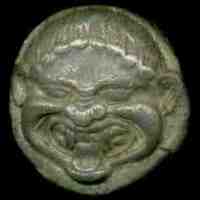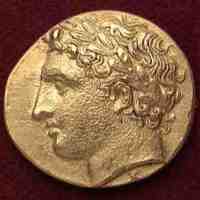
Gorgon's head on a silver coin of Naples
Greek Civilization
Fall 2001

The god Apollo on a gold coin of Syracuse

Gorgon's head on a silver coin of Naples |
Greek Civilization
Fall 2001 |

The god Apollo on a gold coin of Syracuse |
Instructor: Dr. Victor A. Leuci
Texts:
Writing-Intensive Option: Several different types of writing will be part of the course: microthemes, in-class exams that are predominately essay, and/or take-home exams (note that writing intensive students must choose the take-home version for two of the exams). Seven microthemes will be assigned as a means to help participants come to a better understanding of important themes, ideas, and concepts. One of the first microthemes will be revised on the basis of a conference with me; three of the following microthemes will be revised on the basis of a conference with a tutor at the Writing Lab. These conferences must take place sooner than the day before an assignment is due (i.e. if a paper is due on a Thursday, the conference must take place on the previous Tuesday or earlier). A critique and conference after the completion of a paper may also occur. Any/all of the other microthemes and take-home exams may be revised on the basis of a conference with me or a tutor at the Writing Lab. In general, participants in the class should highly consider using the services of the Writing Lab and especially the Lab tutors, who can be of tremendous assistance.
Format: The course will consist of both lectures and discussion. The class will occasionally be divided into small groups to treat discussion topics that will most often be based on readings from ancient authors. Microthemes may be assigned based on the results of the small group discussions. The microthemes are especially designed to facilitate the learning of important details and concepts of the course. Often the microthemes will represent the first opportunity to come to grips with an important block of material or ideas which we will treat from several different perspectives or in several different contexts.
Grading: 2 Exams (100 points each) and 6-8 microthemes (each worth 30 points and each 600-900 words long)--Note: the last two microthemes are due when the final is scheduled and are, in effect, the final. You may choose to double the length of either or both of the last two microthemes (i.e. the final) with a resulting doubling in points either or both are worth--note that these are not "extra credit" points, but also increase the total number of points your grade is calculated from. In addtion class participation (which may include web discussion) will count for 50 points. No late papers will be accepted without prior permission. A hard copy and an electronic copy of papers are due at the beginning of the class period (failure to turn in an electronic copy will result in a two letter grade deduction in the grade of the assignment). I expect you to abide by Westminster’s honor code. Let me repeat, no make-up work will be accepted for unexcused absences. A hard copy and an electronic copy of papers are due at the beginning of the class period. If you know that something has come up that will prevent you from turning your work in on time, confer with me BEFORE the due date of the assignment.
Exams: The exams will be a combination of fill-in the blank or short answer with essays. Usually there will be 10-15 fill in the blank questions worth 2 points each and two essays (300 to 400 words each) worth 35 points each. The essays should be well written in standard paragraph format and replete with pertinent facts to support your thesis (or theses). A review sheet will be typically available on-line one week before the exam as an aid in your preparation. Some exams may have a take-home option (the review sheet for that exam will give more details).
Papers:
Content:
TOPICS AND ASSIGNMENTS (tentative)
|
Aug. 28
|
Tu
|
General Introduction. The Minoans and the Mycenaeans. Pomeroy Ch. 1, 1-17 |
|
30
|
Th
|
The Mycenaeans, cont. Pomeroy Ch. 1, 18-40 |
|
Sept. 4
|
Tu
|
The Dark Age, Pomeroy Ch. 2, 41-70 |
|
6
|
Th
|
Intro. to Homer and the Heroic World. The Iliad, von Staden 46-89. Discussion Questions & helpful web sites (click here) |
|
11
|
Tu
|
Classes Cancelled due to National Disaster |
|
13
|
Th
|
Finish the Iliad.Begin The Odyssey, von Staden 90-112; Discussion Questions & helpful web sites (click here) |
|
18
|
Tu
|
Finish the Odyssey. von Staden 113-149; Microtheme #1 due (note change) (Topic.) |
|
20
|
Th
|
Archaic Greece: Kebric, Ch. 1. Also web sites: (translation of some of Archilochus' poetry; translation of some Lyric Poets) Discussion Questions |
|
25
|
Tu
|
Archaic Greece: Kebric, Ch. 1-2 (Poem of Tyrtaeus; Sappho's poetry) (Discussion Questions) |
|
27
|
Th
|
Archaic Greece, Kebric, Ch. 2 (Discussion Questions); Microtheme #2 due: (Topic.) |
|
Oct. 2
|
Tu
|
NO CLASS. School Holiday |
|
4
|
Th
|
The Olympics, Kebric, Ch. 3; Review for Exam I |
|
9
|
Tu
|
Archaic Greece, Kebric, Ch. 4, 92-105 |
|
11
|
Th
|
EXAM I: Review Sheet for Exam (click here). Take-home exam (click here) |
|
16
|
Tu
|
Sparta. Pomeroy Ch. 4 |
|
18
|
Th
|
Athens. Pomeroy Ch. 5, 159-177 |
|
23
|
Tu
|
Herodotus and the Persian Wars. von Staden 152-160; selections on the web; Pomeroy Ch. 5, 178-200, and Ch. 7, 260-262; |
|
25
|
Th
|
Herodotus and the Persian Wars continued; Microtheme #3 due:(Topic.) |
|
30
|
Tu
|
Fifth Century Life; Intro. to Greek Drama. Pomeroy Ch. 6, 201-225, 233-244, and Ch. 7, 262-264 |
|
Nov. 1
|
Th
|
Greek Drama. Sophocles’ Oedipus the King. von Staden 226-266 |
|
6
|
Tu
|
Aristophanes’ Lysistrata. von Staden 310-351 |
|
8
|
Th
|
Fifth Century Art & Architecture. Pomeroy Ch. 6, 225-233, and Ch. 7, 274-283; Microtheme #4 due:(Topic.) |
|
13
|
Tu
|
Thucydides and the Peloponessian War. Pomeroy Ch. 6, 265-267, and Ch. 8, 319-323, 326-330 von Straden 208-223 |
|
15
|
Th
|
EXAM II: Review Sheet for Exam (click here). Take-home exam (click here) |
|
20
|
Tu
|
Kebric, Ch. 7; Microtheme #5 due: (Topic.) |
|
22
|
Th
|
NO CLASS Thanksgiving |
|
27
|
Tu
|
The Fourth Century; the Trial and Death of Socrates, von Straden 354-381 |
|
29
|
Th
|
The Fourth Century, continued. Pomeroy, Ch. 9; Phillip II, Pomeroy, Ch. 10, 377-381, 390-391; Microtheme #6 due: (Topic.) |
|
Dec. 4
|
Tu
|
Alexander the Great and the Hellenistic World, Pomeroy Ch. 11, 423-425 and Ch. 12, 441-470; Kebric, Ch. 8, 223-228, 256-257; Theocritus (handout) |
|
6
|
Th
|
A Taste of Ancient Greece |
|
12
|
W
|
3:00 p.m. (TR 9:25 a.m. class) FINAL (Topics) |
|
14
|
F
|
8:30 a.m. (TR 2:00 p.m. class) FINAL (Topics) |